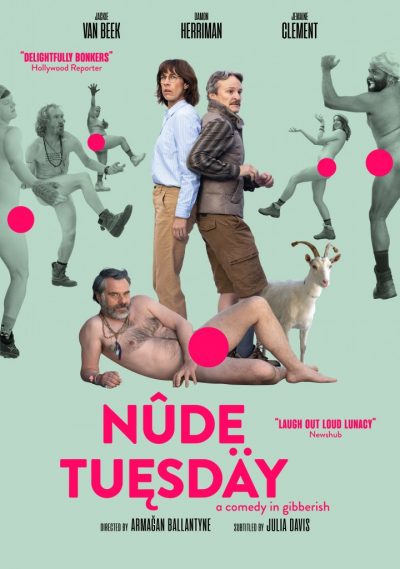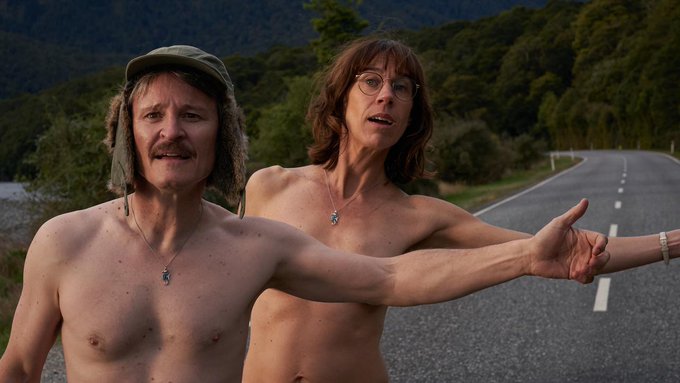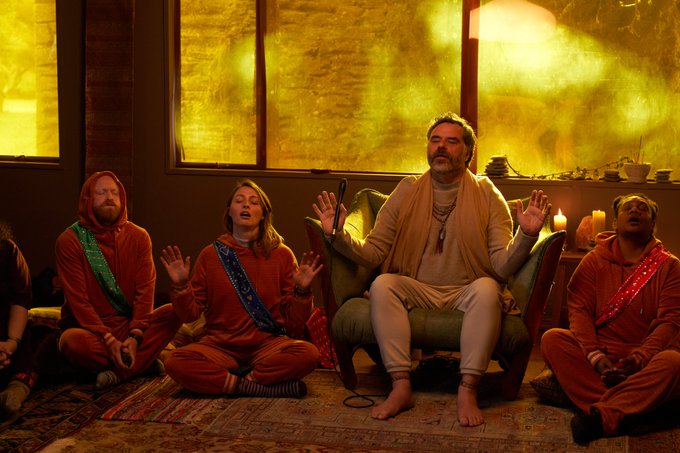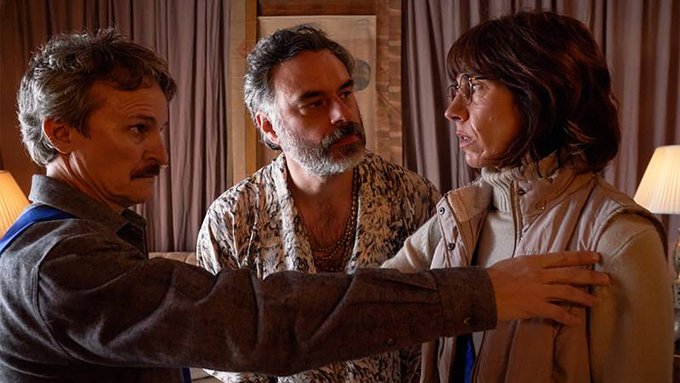‘Nûde Tuęsdäy’ spotlights the importance of communication

“Nûde Tuęsdäy” (“Nøken Tĩsdøĝ”) (2022). Cast: Jackie van Beek, Damon Herriman, Jemaine Clement, Ian Zaro, Charlie Preston Crayford, Byron Coll, Yvette Parsons, Chris Bunton, Chris Parker. Director: Armağan Ballantyne. Screenplay: Jackie van Beek. Story: Jackie van Beek and Armağan Ballantyne. Subtitle Writers: Ronnie Chieng, Celia Pacquola and Julia Davis. Web site. Trailer.
It’s been said that talk is cheap. And, unfortunately, when it’s treated as such, its value is often weakened and, consequently, undermined. That can prove problematic, even fatal, in significant applications, such as self-expression and the conveyance of important or meaningful information. The implications of this can carry tremendous impact, especially when it comes to things like relationships, particularly those of a high personal nature, as is the case in the raucous new sophisticated silly sex comedy, “Nûde Tuęsdäy” (“Nøken Tĩsdøĝ”).
When things go south in the bedroom, maintaining a relationship can be challenging, even for those who have been together for a while. So it is for longtime married couple Laura (Jackie van Beek) and Bruno (Damon Herriman), a suburban working class duo with two kids. Laura is preoccupied with her job at an advertising agency, keeping up the household and attempting to treat a chronic female problem that has caused her to lose virtually all interest in sex. Bruno, meanwhile, goes about his business as a salesman at a plumbing fixture retailer and doing his best to be a good dad, but those responsibilities have done nothing to diminish his libido. His wife’s lack of desire, however, thwarts him at every turn, leading him to partake in one cold shower after another.
Because of these opposing attitudes, Laura and Bruno seem to keep talking past one another, not really hearing what the other has to say, especially when it comes to their love life. This is reflected in the film’s dialogue, which is spoken, quite literally, in gibberish, with English “translations” shown in subtitles. This clever linguistic element thus serves to reinforce the frustration the spouses are feeling. Laura believes she’s being pestered for something for which she has no time, energy or desire. Bruno, in the meantime, feels he’s being deprived of something that should be a normal part of a healthy relationship. Of course, as these circumstances demonstrate, that relationship has become anything but healthy.
So what are Laura and Bruno to do? There are solutions out there, but they don’t appear to have explored any of them, given their respective lack of interest and effort. But one possible remedy emerges when they receive an anniversary gift from Bruno’s unapologetically outspoken mother – an all-expense-paid visit to an erotically focused couples retreat in the wilderness. Laura and Bruno are initially unsure about whether to avail themselves of this unexpected present, but they soon relent and decide to give it a shot for what it’s worth. Little do they know what they’re getting themselves into.
Upon arrival at the retreat, Laura and Bruno feel like the proverbial fish out of water. They meet an array of colorful couples who are involved in all manner of different relationships. They find heterosexual, bisexual and gay partners who have teamed up in various commitment configurations with differing numbers of participants. They’re all generally enthusiastic about their participation in the event, thanks in large part to the facilitation of an enigmatic but self-absorbed, whacked out sex guru, Bjorg (Jemaine Clement). But Laura, and, to a lesser extent, Bruno, are reluctant to join in the activities, given their highly unconventional nature, such as a series of outlandishly hilarious exercises that positively slay libidinous group encounters and esoteric New Age gatherings. The uptight couple is even asked to select a farm animal mascot to provide them with sensual “inspiration” to help them get their sex life and relationship back on track.

As time passes, Laura and Bruno begin to warm to their circumstances, a process in which they learn new things about themselves and their marriage. Inhibitions fall away, but not necessarily in expected ways, again, often with sidesplitting outcomes. But what will this mean for their future? That remains to be seen, particularly in light of their participation in the retreat’s marquee event, Nude Tuesday. Clarity may at last be possible – or so they hope.
Communication is fundamental to the success of any relationship, be it of a creative, business or romantic nature. Yet all too often this is where these affiliations begin to suffer and break down. Ideas aren’t expressed as clearly as they could be – or at all – leading to an assortment of problems. Frustration frequently emerges, leading to a distancing that’s not entirely unexpected. And, before the partners to these arrangements are aware of it, things dissolve, an often-regrettable (and avoidable) outcome.
So what causes this breakdown in communications? It frequently rests with the partners not being able to adequately express themselves. At the heart of this is an inability or unwillingness to sufficiently put their beliefs into words. And that underlying failing carries bigger implications, because our beliefs form the basis of the reality we experience thanks to the conscious creation process, the philosophy that maintains these resources produce those results. When our beliefs are inadequately conveyed to those we depend on in such collaborations, they become innately misinterpreted, leading to disconnects that can set us on the path to problems and eventual dissolutions. How sad is that, particularly when such outcomes can be prevented?
Such situations are characterized by the aforementioned act of talking past one another. When each partner in a relationship is ill equipped to articulate what he or she wants, misunderstandings of the beliefs underlying them result, producing circumstances that the parties are likely to find unsatisfactory. As noted above, this can lead to frustration and, eventually, animosity and resentment.
This naturally begs the question, “Can these scenarios be avoided?” The answer, thankfully, is a resounding yes, but it takes a concerted effort to bring it about. Key to this is finding the means to express our beliefs as clearly and effectively as possible. But, before that can happen, we must first make an attempt at precisely identifying what those beliefs are to begin with, a capability at which many of us may be deficient, particularly if we’re unaware of the conscious creation process and its ramifications. Thus making ourselves aware of this school of thought and its basic principles is a good starting point. And, with such an awareness in hand, we can then move on to identifying the specific beliefs we hold and what they’re intended to manifest.
Once these steps are put in place, the relationship parties can then compare notes. With each collaborator making his or her wishes plainly known so that the other understands what’s being sought, the partners can then move toward devising a solution that meets both of their needs and desires. This makes possible successful acts of co-creation, where everybody has the potential to come up a winner.

This process probably seems self-evident to most of us, as it essentially outlines the means to reach effective compromise. However, it’s astounding how often we fail to attain such a result. In most of these cases, failure is usually attributable to not putting the foregoing groundwork into place. Instead, we look on in confusion, unable to fathom how our fellow collaborator doesn’t seem to grasp where we’re coming from or what we want. Again, this prompts the aforementioned frustration, animosity and resentment, qualities that lead to breakdowns in communication and, ultimately, the undertaking in which we’re mutually engaged.
Laura and Bruno epitomize this scenario. Given Laura’s mindset with everything she has going on in her life, she’s unable to understand why Bruno is insensitive to her needs and can’t control his testosterone-driven urges. By contrast, Bruno is unable to fathom Laura’s unwillingness to engage in an activity that he sincerely believes is supposed to be an integral aspect of a healthy relationship. Their needs and the beliefs that underlie them apparently aren’t being expressed well enough so that the other can understand them, producing the fundamental disconnect that the couple is experiencing, an outcome that illustrates what can result when our beliefs are not given adequate articulation.
In its own way, the retreat is an attempt to compensate for the failure of previous efforts at reaching compromise. Unconventional though it may be, the event could be seen as a manifestation designed to draw out the beliefs that Laura and Bruno have not adequately expressed through more typical means. And, to an extent, that proves to be true, though, somewhat surprisingly, the retreat sheds light on revelations in the couple’s respective beliefs that they were unaware of going in. This raises the specter that what Laura and Bruno each thought they knew about their beliefs at the outset was intrinsically flawed, that they were clinging to assessments that did not provide them with a clear picture of their actual beliefs.
When such revelations emerge, we may be dumfounded at what we discover. However, if we’re to truly get what we want out of life, we have to operate from a position of truth, especially where our beliefs are concerned, given their power and function. These developments may knock us for a loop, and we might lament some of the consequences that come from them. But, if such a venture leads us to a place of happiness and fulfillment that potentially exceeds our expectations, isn’t that worth it?
That’s what Laura and Bruno could be preparing to discover for themselves. Getting there may take them out of their comfort zone, but, considering that their situation hasn’t been terribly comfortable for quite some time, then one could argue that the process represents time and effort well spent. And who knows what that could yield!
The foregoing is not meant to suggest that this film is all seriousness and heavy-handed psychological drudgery. Far from it. However, it’s heartening to see a film with subject matter like this making an effort to provide viewers with something more than what they typically find from movies in this genre. That’s why I have termed this offering “a sophisticated silly sex comedy.” To most, that might sound like a contradiction in terms, yet that’s precisely what this hilarious release from Down Under is all about. Director Armağan Ballantyne’s second feature follows the raucously funny misadventures of a sexually stagnated couple as they attempt to revive the erotically amorous aspect of their marriage, and it does so with inventive touches in the dialogue and sight gags, setting it apart from many other contemporary comedies, particularly those of this kind. Admittedly, the film starts to run out of gas in the final half hour, and its otherwise-frenetic pacing sags a bit when the narrative starts to turn more serious and sentimental. However, there’s a lot more going on with this ambitious offering than one might expect, especially in the laughs department. It’s quite a feat to take material that might ordinarily be considered crass or low brow and make it funny with a surprising degree of style and sophistication. Give this one a chance; you just may walk away with a sore funny bone.

“Nûde Tuęsdäy” deserves special recognition for its imaginative linguistics, using gibberish as the basis of the dialogue. To the ear, the “language” of the film sounds like an amalgam of various European tongues, most notably Dutch and Scandinavian dialects. But the humor behind this fabricated language comes out strongest in the subtitles, which are positively uproarious. The impact of their humor benefits tremendously from the split-second delay that comes between hearing the lines spoken and reading their content, providing an ongoing series of “aha!” moments as the translations appear on screen. Of course, it certainly helps that the subtitles are brilliantly written. Moreover, they play such a vital role in the character and success of the film that their writers have been deservedly given their own writing credits, something I’ve never before seen accorded to the creators of screen captions. According to director Ballantyne and actor-writer van Beek, the subtitle crew was given tremendous leeway in coming up with their material, and that unfettered creativity shows in the boundary-pushing result.
Incidentally, the use of gibberish in the film is so pervasive that it even turns up in the “lyrics” of cover versions of several musical numbers. Viewers are sure to chuckle when they hear the gibberish versions of songs like the Talking Heads’ Road to Nowhere (itself a wryly fitting choice in light of the picture’s subject matter), the Zombies’ Time of the Season and the Phil Phillips romantic standard Sea of Love. Indeed, budding screenwriters and soundtrack composers could learn a lot from the innovation at work in this offering.
Finding this film may take a little effort, at least at the moment. It’s currently playing theatrically Down Under, and it’s showing up on the film festival circuit elsewhere. However, I wouldn’t be surprised to see a North American release come along at some point given the highly favorable response this picture has received from movie critics. That could go a long way toward eventually getting this worthwhile offering onto screens and/or streaming services in the US and Canada, something well worth waiting for.
“We have a failure to communicate” is frequently trotted out when situations calling for cooperation begin breaking down. How ironic it is that we’re often able to identify the source of this problem without being able to rectify the source of the trouble itself. And that’s where these matters can fall apart – and needlessly so. However, with some effort to better express ourselves and articulate the beliefs that underlie where we’re coming from, this so-called failure needn’t be an issue at all, and such an adjustment could help us to forestall difficulties in areas like our dreams, wishes, relationships and – dare I say it – sex lives. And, if that’s not something worth making an effort for, I don’t know what is.
Copyright © 2022, by Brent Marchant. All rights reserved.



